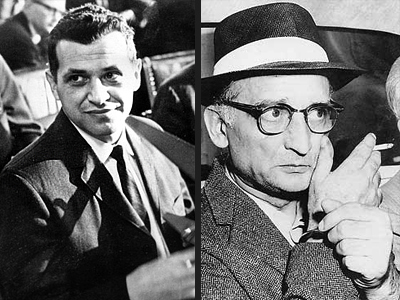January 22-2016

The Obama Administration in effect paid ransom last week to free five Americans imprisoned in Iran. Many—especially Republicans running for president—condemned the whole idea of ransoming people, saying it only encourages others to take hostages.
Analysts generally agree with that GOP critique. The United States, however, has a long history of making deals to free its citizens held abroad. In fact, it has made three such deals with the Islamic Republic—the most notorious one organized by Republican President Ronald Reagan, a point the GOP candidates do not mention.
Going back a half-century, Democratic President John F. Kennedy agreed to the 1962 exchange of a major Russian spy, Rudolf Abel, for an American pilot, Gary Powers, who was shot down over the Soviet Union while flying a U-2 spy plane. That negotiation is the basis for the film, “Bridge of Spies,” currently in theaters. The film was nominated this month for a Best Picture Oscar.
In 1981, Democratic President Jimmy Carter worked out a deal to free the 52 American embassy hostages in Iran—more people freed than in all the other US deals combined. Ironically, it was a cost-free exchange for the United States, which paid Iran about $12 billion, all of it Iranian assets that had been frozen by Carter when the US embassy was overrun. In other words, Carter paid for the hostages with Iran’s money.
In 1986, Reagan exchanged a convicted Soviet spy for Nicholas Daniloff, a correspondent for US News & World Report who had been arrested in Moscow for no apparent reason. Some thought he was nabbed specifically as trade goods, just what the GOP candidates this year say they fear.
None of those three exchanges raised much controversy.
But then Reagan agreed to send Iran shipments of TOW anti-tank missiles and spare parts for Iran’s Hawk anti-aircraft system in order to free Americans being held by the Lebanese Hezbollah. Iran to this day accuses the United States of sending arms to Saddam Hussein’s Iraq, although the only weapons the United States provided to either party in the 1980-88 war were these missiles and parts sent to Iran.
That exchange became very controversial because Reagan had publicly said several times he would never pay ransom to free Americans—and then he plaid ransom. It was the hypocrisy, not the trade itself, that sparked criticism.
President Obama has been the trader-in-chief, however. In 2010, he sent Russia 10 sleeper agents the FBI had swept up in exchange for four Russians—not Americans—who had been jailed for links to the West. Few criticized that trade.
In early 2014, he traded five Taliban held at Guantanamo Bay for Sgt. Bowe Bergdahl, an American soldier held prisoner by the Taliban in Afghanistan who has now been charged as a deserter. Many Republicans were furious over freeing terrorists for a man they called a traitor.
Later that year, he traded three Cuban spies for a Cuban who had spied for the United States and for Alan Gross, who had been caught in Cuba distributing anti-regime materials. Few criticized that trade.
Last week, Obama traded seven people jailed by the US for sanctions offenses for five Americans jailed by Iran. The irony in this exchange was that, except for one man on each side, all those involved in the exchange were dual-national Iranian-Americans. In other words, Obama paid with Iranian-Americans to free Iranian-Americans.
Critics of the nuclear deal with Iran often say Obama should have a tough policy like the Israelis. Over the years, Israel has traded thousands of Palestinian prisoners for captured Israeli soldiers.


















